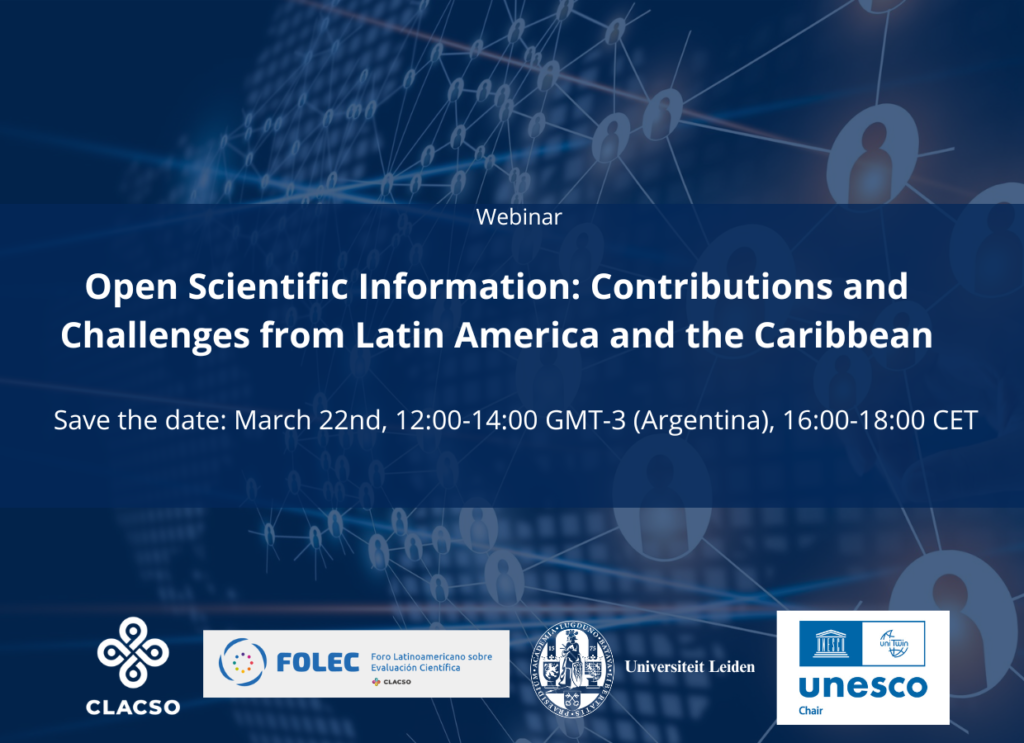
WEBINAR: Contributions and Challenges from Latin America and The Caribbean
Save the date: March 22nd, 12:00-14:00 GMT-3 (Argentina), 16:00-18:00 CET
In order to advance responsible evaluation of research and open science, and to promote more transparent and high-quality decision-making, debates are being generated with the purpose of changing the landscape of open research information and transforming existing restrictive practices. For example, universities such as Antioquia, Sorbonne, and Leiden are embracing open, free, and participatory tools.
Given the proliferation of open scientific information infrastructures (such as LA Referencia, AmeliCA, Redalyc, SciELO, Latindex, Open Science Lens, and OpenAlex, among others), it seems like an opportune moment to expand dialogues and join efforts to enhance access, transparency, and diversity of scientific information available to universities and research centers, as well as to strengthen the transparency and contextualization of research evaluation processes.
In this scenario and considering your expertise, we would like to invite you to participate in a dialogue space where we are interested in hearing your opinions on the potentialities and difficulties in the use of open infrastructures, as well as the possibilities for organizing open data to facilitate its availability and shared use.
Preliminary Program
Coordination: Ismael Ràfols, CWTS, University of Leiden, UNESCO Chair on Diversity and Inclusion in Global Science.
12:00-12:10pm GMT-3 (Argentina) Welcome Remarks by the UNESCO Chair of CWTS, University of Leiden, and CLACSO.
12:10-12:50 GMT-3 Institutional Experiences in the Use of Indicators in Science and Technology: Opportunities and Challenges. Speakers:
- Cécile Arènes and Amélie Church, Sorbonne University, Paris.
- Gabriel Vélez Cuartas, COLAV Coordinator, University of Antioquia, Medellín.
- André Brasil, CWTS, UNESCO Chair, University of Leiden.
- Bernardo Rondelli, Siris Academic Foundation.
- Ignasi Labastida, Director of the Office of Knowledge Dissemination, University of Barcelona.
- Fernanda Beigel, Director of the OLIVA Project, CECIC, University of Cuyo, Mendoza.
- Rodolfo Barrere, Coordinator of RICYT.
12:50-13:30pm GMT-3 Open Scientific Information as a Global Public Good: Contributions and Plans of Infrastructures in Latin America and the Caribbean. Speakers:
- Ana María Cetto, Founder of Latindex, President of UNESCO’s World Open Science Steering Committee.
- Rodrigo Costas, CWTS, UNESCO Chair, University of Leiden & University of Campinas.
- Lautaro Matas, Executive and Technical Secretary of LA Referencia.
- Arianna Becerril, Executive Director of Redalyc.
- Abel Packer (to be confirmed), Coordinator of the SciELO Program.
13:30-13:55pm GMT-3 Round of exchanges and questions.
13:55-14:00pm GMT-3 Closing Remarks by Laura Rovelli and Dominique Babini (CLACSO).
Co-organized by UNESCO Chair on Diversity and Inclusion in Global Science, CWTS, Leiden University, Latin American Council of Social Sciences (CLACSO) Broadcast: CLACSO’s YouTube and Zoom networks.
